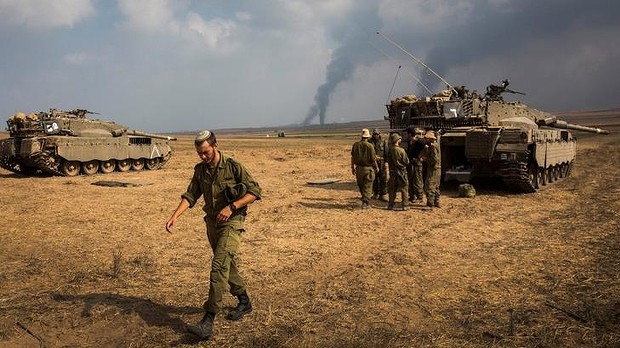IN THE MEDIA
After the Gaza conflict: The view from Israel
September 20, 2014 | Ahron Shapiro

Ahron Shapiro
Brisbane Times – September 20, 2014
I arrived at Israel’s Ben Gurion Airport at the end of August, less than 48 hours after Gaza’s rulers Hamas accepted an open-ended ceasefire effectively ending a two-month long conflict with Israel.
Along with the signs giving directions to passport control and baggage claim were signs indicating the nearest bomb shelters – a reminder of rocket attacks that briefly led to the suspension of most flights to and from Israel.
For the first time, Israelis realised that Hamas’ rockets not only posed a terror threat, but could physically isolate Israel.
In the Israeli town of Sderot, I saw the second game-changer from this conflict. In this town close to Gaza, rockets and mortars are, sadly, nothing new but a new threat was seen underground in nearby Kibbutz Nir Am, in the form of concrete reinforced terror tunnels.
On July 21, Hamas activated two tunnels stretching from Gaza into the kibbutz’ fields and sent 10 militants masquerading as IDF soldiers to attack the kibbutz. The infiltrators were detected and stopped, though four Israeli soldiers were killed in the firefight.
It was one of numerous deadly cross-border tunnel attacks Hamas initiated during the fighting, necessitating Israel’s limited ground offensive into Gaza to destroy the tunnels.
Hamas claims victory in the war it provoked, and perpetuated through repeated refusal to accept or respect ceasefires – but it eventually accepted Egyptian-brokered ceasefire terms little different to ones it had refused since the beginning of the conflict.
The only “achievement” Hamas has to present to Gazans is its retaining of both control of Gaza and some weapons. Yet removing Hamas from power was never one of Israel’s stated goals, nor was there any expectation it could demilitarise Gaza without international co-operation.
The IDF did set many verifiable goals and achieved most of them: Terror tunnels worth hundreds of millions of dollars were demolished; hundreds of trained Hamas militants were killed (at least 800 according to the latest estimates); and Hamas and its radical allies lost perhaps three-quarters of their rocket arsenals.
Most importantly, Israel deterred Hamas from employing warfare as a means to force Israel and Egypt to end their UN-approved blockade of military and dual-use materials to Gaza – something which would have allowed Hamas to quickly resupply and restore its military capacity in preparation for renewed hostilities. Hamas’ financier Qatar and ally Turkey had supported this scheme in a ceasefire plan that Hamas was ultimately forced to abandon in the face of Israeli tenacity and resolve.
Media-savvy Israelis were long aware that Hamas had spent years and many millions of dollars creating a defence strategy – for its military assets exclusively, not the civilian populace of Gaza – that hid its rocket arsenals and launchers, command centres and top military personnel inside and underneath densely populated neighbourhoods.
The high Gaza civilian death toll, while regrettable, was understood by most Israelis to be an unavoidable consequence of Hamas’s tactics.
Moreover, Israelis believe their army succeeded in their goal of minimising civilian deaths. Contrary to UN claims based on Hamas sources that 70 per cent or more of Gazan casualties were civilians, ongoing research by a respected Israeli NGO independently investigating the casualty lists says that number is closer to 50%. Compared to other recent wars in urban environments, this is not actually high.
Israel lost 66 soldiers and six civilians – and for a country with compulsory service, the domestic pressure on the government was primarily over whether enough was done to minimise the loss of Israel’s young soldiers.
In the wake of the conflict and his consistent condemnations of Hamas’ destructive tactics, Palestinian Authority President Mahmoud Abbas’s stocks of credibility are relatively high here in Israel.
They are further raised by statements suggesting Fatah will not advance its unity plans with Hamas unless Hamas is willing to turn over its weapons and control of Gaza’s institutions to the Ramallah-based government.
Nonetheless, Abbas’s recent Arab-League-backed proposals to internationalise the conflict by getting the UN to demand a unilateral Israeli withdrawal are a non-starter. Abbas will find an Israeli public ready to give him the benefit of the doubt – but only if he re-engages with Israel directly.
Israelis crave a secure peace with the Palestinians, which is why at least three Israeli peace offers have been made to the Palestinians since 2000, offering the Palestinians an independent state on virtually all of the West Bank and Gaza, after land swaps.
Israelis and moderate Palestinians who support a two-state resolution understand that Hamas, at its core, is an obstacle to peace – an organisation that calls for genocide against Jews in its charter and never entertained support for a two-state outcome as anything more than a temporary stepping stone to Israel’s destruction.
The campaign to finance the reconstruction of Gaza’s war-torn areas is now increasingly being seen by the PA, as well as international donors, as an opportunity to squeeze Hamas and reduce its ability to play the role of spoiler.
The key to avoiding another Gaza war is to help the PA, along with Israel and Egypt, to achieve their shared goal of demilitarising Gaza and preventing Hamas rearming.
Ahron Shapiro is a policy analyst at the Australia/Israel & Jewish Affairs Council.
This story was found at: http://www.brisbanetimes.com.au/comment/after-the-gaza-conflict-the-view-from-israel-20140920-10jk7c.html
Tags: Israel





